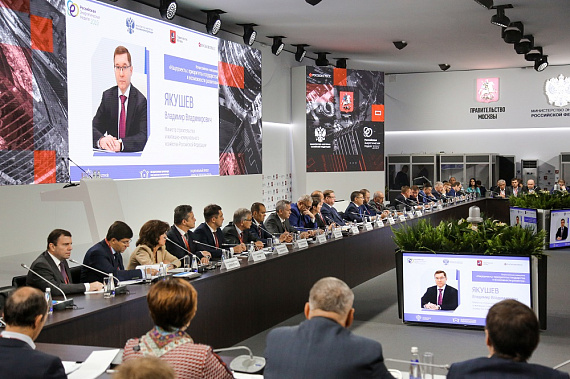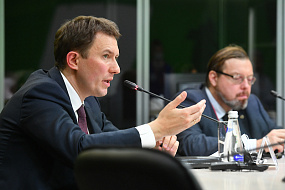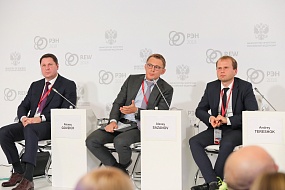All-Russian Meeting on ‘National Projects: State Priorities and Opportunities for Growth’ at REW 2019

Today, on 2 October
2019 the Russian Energy Week International Forum hosted the All-Russian Meeting
on ‘National Projects: State Priorities and Opportunities for Growth’ dedicated
to reaching national goals in construction, housing and utilities, urban
environment and public utilities infrastructure upgrade.
This event gathered
regional leaders, representatives of legislative bodies and government agencies
from 72 regions of the Russian Federation, and industry experts. The meeting
was organized by the Housing and Public Utilities Reform Support Fund.
Key topics of the
meeting included the status of such national projects as ‘Housing and Urban
Environment’ and ‘Ecology’, as well as effective information technologies used
to implement national projects. Participants focused on urban space development
and introduction of energy efficient technologies under national projects.
Executive Director of the National Center for Public Control in the Field of
Housing and Communal Services HCS Control Svetlana Razvorotneva moderated this
open mike event.
Minister of
Construction, Housing and Utilities of the Russian Federation Vladimir Yakushev
stated: "One of the key tasks of the ‘Housing and Urban Environment’
national project is to commission more housing under the housing construction
reform. The mode of cooperation among federal, regional and municipal
government agencies, developers and banking society – that is becoming one of
the key players in this process – must be constant.”
Sergei Stepashin,
Chairman of the Supervisory Board of National Center for Public Control in the
Field of Housing and Communal Services HCS Control, emphasized that Russia’s
housing and utilities segment has a great potential for higher energy
efficiency: it accounts for one-fifth of the country’s total potential for lower
energy consumption. “If we take total volume of resources produced in the
country, the current relative share of resource consumption in apartment
complexes will be 52% for heat and 30% for electricity. While Russia ranks 21st
among energy efficient economies,” noted Sergei Stepashin.
He also mentioned a
very low share of energy efficient housing being constructed for people
relocated from dilapidated housing. “Starting from 2010, 154 energy efficient
apartment complexes have been built in 37 Russian regions, with a total area of
266 thousand sq. metres, which makes for only 1.7% of total area of dilapidated
housing involved in this programme. This is caused by a conflict between two
focal points of government policy in government-sponsored capital construction:
minimizing capital spending and improving energy efficiency through the use of
cutting-edge technologies and materials, which leads to an evident construction
cost increase of 7–12%,” stated Sergei Stepashin. “In order to resolve this, we
need to factor in construction of 100 thousand sq. metres of energy efficient
housing annually starting from 2020 for the relocation programme. I offer
additional financing from the Public Utilities Fund of up to 5 thousand
roubles/sq. metre as a motivation, which will require a target-specific share
of up to 500 million roubles a year as part of the asset contribution. I
propose to allocate those funds for constructing energy efficient housing that
went through a lifecycle cost assessment.”
Oleg Melnichenko,
Chairman of the Committee on Federal Structure, Regional Policy, Local
Government and Northern Affairs of the Federation Council, spoke about
proposing the State Duma a bill on new mechanisms to relocate people from
dilapidated housing.
In his speech, Ilya
Osipov, Member of the Committee on Housing Policy and Housing and Utilities of
the State Duma, mentioned the need for earlier financing of regional programmes
than it is stipulated now but without raising expenditures. He noted positive
experience of Moscow and other regions in housing retrofitting and relocating
people from dilapidated housing under this programme. “If we talk energy
efficiency, old housing is not energy efficient. That is why we need to speak
more about capital repairs. Because a sustainable decrease in dilapidated
housing can only be reached through not letting it become dilapidated. It is
crucial for us to define the criterion of dilapidation,” said Ilya Osipov.
Minister of
Construction of Kirov Region Ruslan Bondarchuk emphasized Public Utilities Fund
money allocation throughout different stages of the programme. “The most
funding is allocated for the 2023 and 2024 stages. While the Fund’s financing
in 2019 is 491.1 million roubles (11.7% of total volume planned). Preliminary
limits for 2020 and 2021 are 314.7 million roubles. A significant amount of
housing is included in the programme in 2021–2023, and people should be
relocated in the coming years. But the Fund’s approved limits, as well as
limited regional budgets prevent us from increasing the funding for 2020 and
2021 stages,” stated Ruslan Bondarchuk.
Governor of Novosibirsk Region Andrey Travnikov shared their region’s
experience in successfully cooperating with the Public Utilities Reform Support
Fund. Novosibirsk Region used public-private partnership principles to
implement to complex projects for upgrading public utilities systems. The cost
of the upgrade was 680 million roubles. As a result, the regional government
was able to cut the annual subsidies for municipalities in the amount of 80
million roubles. “We got the approval for the third project from the Fund
management last week. It is a project to upgrade the public utilities systems
in Cherepanovo, a town of 19 thousand people. The total cost of construction
and assembly is 740 million roubles. The anticipated effect is to cut annual
regional grants in the amount of 45–50 million roubles annually and to get rid
of the debt for coal and gas. We are currently preparing the next project,
which will be the fourth one. We hope that the public utilities upgrade
programme will keep going with the support of the Utilities Fund,” explained
Governor of Novosibirsk Region.
Konstantin Tsitsin, General Director of the Housing and Utilities Reform
Fund announced that the State Corporation approved to projects to upgrade
public utilities proposed by Novosibirsk Region. At the meeting, Mr. Tsitsin
gave Andrey Travnikov a voucher for 135 million roubles.
The money allocated
by the Utilities Fund will be used for two projects to upgrade heat and hot
water supply in the western and eastern parts of Cherepanovo. The agreements
provide for co-financed construction of 8 boiler houses and an upgrade of
another one; construction and retrofitting of almost 30 km of heat and hot
water supply network. Under these agreements, the Utilities Fund will allocate
almost 445 million roubles, while the total cost of the projects is 741.4
million roubles. They will be implemented under concession agreements.




